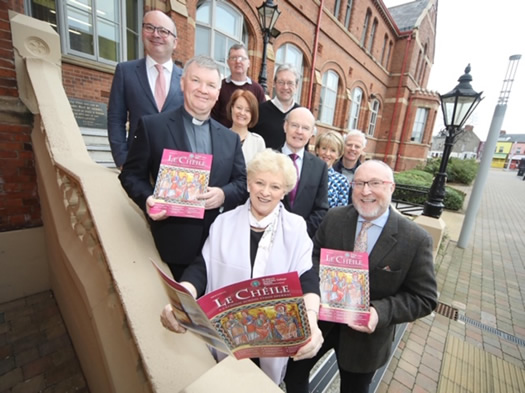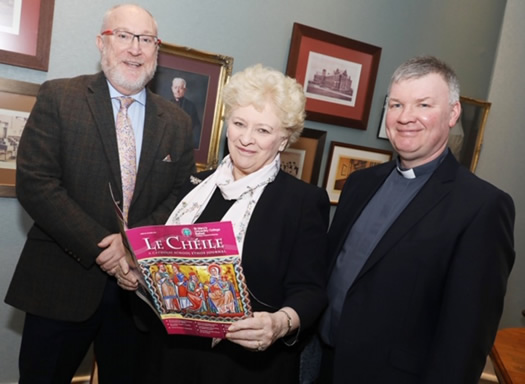|

St Mary’s University College celebrated the 30th issue of Le Chéile: A Catholic School Ethos Journal at a reception and lunch on 4 January 2019 to recognise this significant achievement.
The journal is produced twice per year and is circulated to over four hundred schools and individuals as well as to staff and student teachers. It seeks to articulate the vision of Catholic education and to identify, explore and promote ways in which this vision can be lived in schools. The Managing Editor is Rev Dr Niall Coll, Senior Lecturer in Religious Studies at St Mary’s.
The event to celebrate the 30th issue was attended by the College Principal, Professor Peter Finn, Baroness Nuala O’Loan and her husband Declan O’Loan, Rev Dr Niall Coll, Dr Gerard McCann, Mr Sean McCrystal, Mrs Sharon Haughey, Dr Tracey McKay, Dr Aidan Donaldson and Mr Michael Kelly, editor of the Irish Catholic newspaper.
Baroness O’Loan spoke at the celebration and said:
“I would like to congratulate those responsible for the production of Le Chéile, for it is rich —rich in its content, its illustrations and its beautiful covers — another opportunity to take the gospel story through the wonderful world of art.
“This is where Le Chéile makes a contribution. It reminds teachers of the essence of the Catholic ethos. Through the writing of students, children, teachers and others there is a regular practical publication of what Catholicism teaches and how it is loved!”

Professor Peter Finn with Baroness Nuala O’Loan and Rev Dr Niall Coll
Rev Dr Niall Coll said:
“The thirtieth edition of Le Chéile is a significant milestone, and this lunch underlines that. Thanks to Peter Finn and the College for convening this small group to mark the occasion.
I fell into editing the magazine – on a temporary basis – on the occasion of its third edition in 2005. Gerard McCann and I, in spite of all the other demands on time and energy here since, have stuck together as a team and kept the show on the road … Sean McCrystal in more recent times has done so much to enhance the look and feel of the magazine, and for this I am most grateful.
This lunch provides me with an opportunity to recall that the journal’s mission is to help schools to identify, explore and promote ways of living out the distinctive vision of Catholic education.
It need hardly be said that our schools exist in a climate of intense media and political scrutiny. The constraints imposed on staffing levels and resources by the climate of austerity and political stalemate locally are painful.
For all that, we know that our schools, primary and post-primary, are academically high-achieving and much-praised by the Education and Training Inspectorate for the pastoral, spiritual and social outworking of their ethos.
We know, too, that our schools more than happily coexist alongside state-controlled, integrated and other types of schooling. That is not to imply, however, that they are not under pressure from a broader educational landscape that is increasingly shaped by utilitarian and more secular tendencies.
Not only Catholics feel this pressure: the former UK Chief Rabbi, Jonathan Sacks, has commented (2012): ‘Today, in a Europe more secular than it has been since the last days of pre-Christian Rome, the culprits are an aggressive scientific atheism, tone deaf to the music of faith; a reductive materialism blind to the power of the human spirit ... A consumer driven economy that is shrivelling the imaginative horizons of our children; and a fraying of all social bonds, from family to community ...’
You don’t need me to tell you that Catholic education must see beyond such limited horizons and continue to promote a broader, richer, more holistic vison.
When Catholic schools are faithful to their own distinctive ethos they transcend those pragmatic and utilitarian philosophies that understand the educational enterprise as merely an instrument for the acquisition of information that will improve the chances of worldly success and a higher standard of living.
Catholic education at its best has a profound spiritual and social vision that builds up our capacity for empathy with others, especially the poor and the newcomer. This vision is more necessary than ever in a world so marked by the breakneck speed of technological change and the impersonal networks mediated by smartphones and iPads which so dominate the lives and imaginations of the so-called i-Gens – those born after 1995…
Catholic educators need to articulate and give concrete shape to their vision of education as essentially a humanising endeavour characterised by love, hope and social justice, forming young people who will serve the world with their gifts.
And this is precisely what Le Chéile has been striving to do over its thirty editions … and surely an audience like this needs no persuading of the importance of this work in the years to come.”
Le Chéile - Issue 30 available to download |



